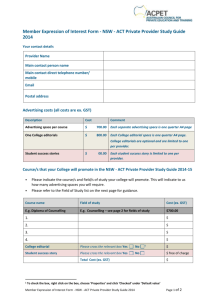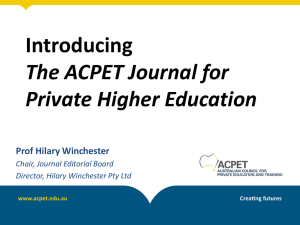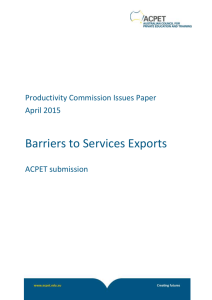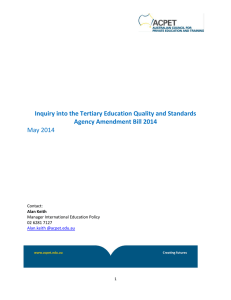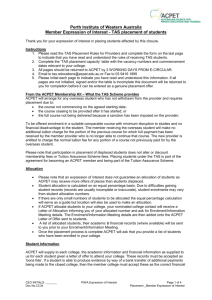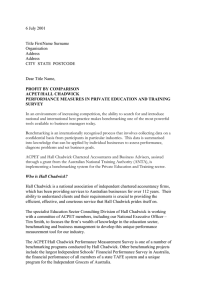ACPET Code of Practice
advertisement
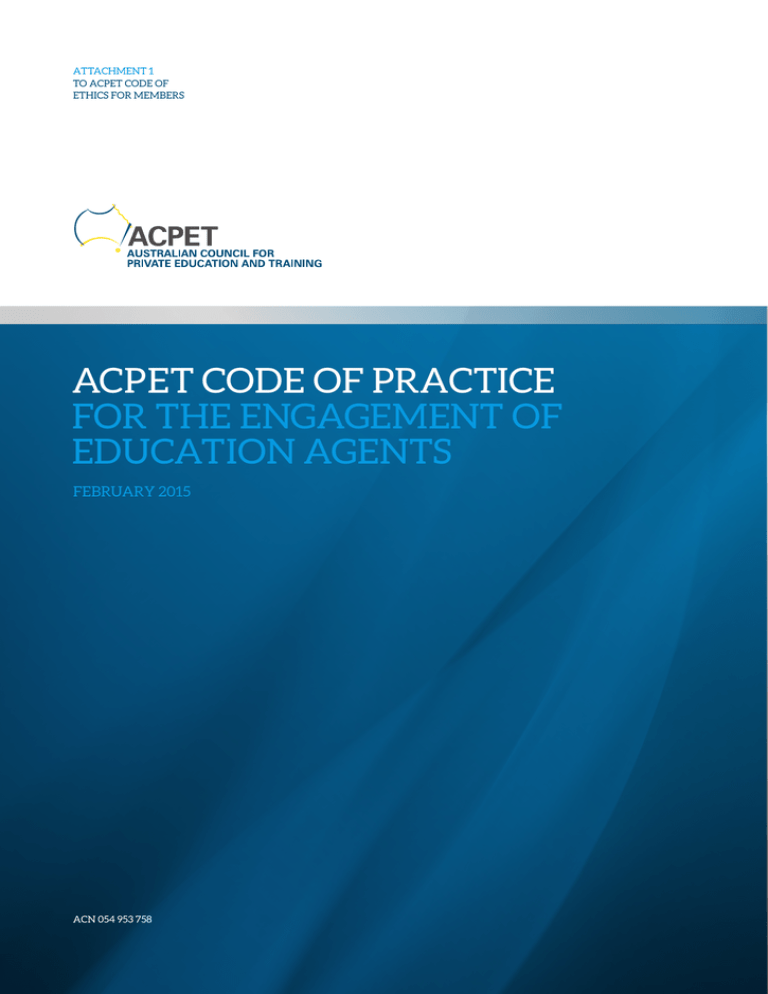
ATTACHMENT 1 TO ACPET CODE OF ETHICS FOR MEMBERS ACPET CODE OF PRACTICE FOR THE ENGAGEMENT OF EDUCATION AGENTS FEBRUARY 2015 ACN 054 953 758 CONTENTS Introduction3 The Code of Practice Principles 4 Schedule 1 6 The ACPET Preferred Agent/Broker list 6 The Code of Conduct for Agents/Brokers on the ACPET Preferred Agents/brokers list Attachments8 2 ACPET CODE OF PRACTICE FOR THE ENGAGEMENT OF EDUCATION AGENTS Introduction To provide confidence to students, industry and government, the Australian Council for Private Education and Training (ACPET) has, with the support of its members, developed a Code of Practice for using the services of agents/brokers (the Code). Implementation of the Code is ACPET’s way of demonstrating that its membership is serious about providing high quality services that students, their families and the community can feel confident will meet their expectations. Amongst other things, ACPET members will use the services of reputable agents/brokers who have a proven track record in meeting the obligations enshrined in the Code. The Code should be seen as additional to the ACPET Code of Ethics for Members1, adherence to which is a condition of ACPET membership. The Code of Ethics affirms the professional standards expected of education and training providers. Members are required to act with integrity in all dealings with students (past, present and future), employers, with ACPET and with other organisations. The Code is intended to provide students with a clear statement of the standards which they can expect from ACPET member organisations in their dealings with them and their nominated representative, including the agents/brokers which they use to attract students. ACPET members will publically make a stand on the need to eliminate those disreputable agents/brokers which are bringing adverse publicity on the sector and undermining the confidence of the community. Such publicity is undermining the credibility of all providers including ACPET members. The Code is a tangible way of differentiating ACPET members from other private providers who may continue to use disreputable agents/ brokers. Simultaneously ACPET is seeking to facilitate the differentiation of those reputable agents/brokers which perform an important function in the sector’s operation by providing a necessary linkage between students and providers. In a real sense the Code ensures that ACPET members will meet their obligations under the various governments’ legislation2, regulations3 and codes of practice4. It will cover the use of agents/brokers who operate both onshore in Australia for domestic and international students and off-shore for international students including Australians who study abroad. While the Code will necessarily only apply to ACPET members, its intention is to provide a framework which agents/brokers who work with or partner ACPET members will be required to operate. In line with the latest ACPET Code of Ethics for Members, February 2015 Education Services for Overseas Students (ESOS) Act 2000 3 Standards for Registered Training Organisations (RTOs) 2015 4 National Code of Practice which operates under the ESOS Act 1 2 3 changes to government standards for post-secondary education providers, such a framework will not be prescriptive in terms of how it is to operate, but rather provide student-centric parameters which encourage and facilitate best practice. To facilitate such high ideals, ACPET will be encouraging all agents/brokers to recognise the Code, undertake ACPET endorsed professional development in the responsibilities of agents/brokers similar to the training offered by the British Council5 and consider membership of ACPET as ‘Partners in Education’, and register on the ACPET Preferred Agents/Broker List. Schedule 1 illustrates the requirements for agents/brokers wishing to be placed on the ACPET Preferred Agents/Broker List and how it links back into ACPET membership. The Code acknowledges the ‘Statement of Principle for the Ethical Recruitment of International Students by Education Agents and Consultants (The London Statement6)’ (see Attachment 1) which outlines an ethical framework and adopted the following seven principles under which providers and agents/brokers should operate: 1 Agents and consultants practice responsible business ethics. 2 Agents and consultants provide current, accurate and honest information in an ethical manner. 3Agents and consultants develop transparent business relationships with students and providers through the use of written agreements. 4 Agents and consultants protect the interest of minors. 5Agents and consultants provide current and up to date information that enables students to make informed choices when selecting an Agent or consultant to employ. 6 Agents and consultants act professionally. 7 Agents and consultants work with providers to raise ethical standards and best practice. The London Statement ethical framework and principles provide a solid basis on which recruitment of students by agents/brokers in Australia could be based and has been used in the development of the Code. The Code has also drawn on material from the Australian Government Department of Education guide for providers of education and training to overseas students titled ‘Using Education Agents’7 (see Attachment 2) which supports the National Code of Practice for Registration Authorities and Providers of Education and Training to Overseas Students 2007 (op. cit.). The Guide provides assistance in establishing a framework designed to assist providers in reaching a reasonable level of assurance that any education agents they engage act appropriately. The guide also identifies and addresses any inappropriate conduct by education agents before there is an adverse impact on the provider’s business and its students. http://www.britishcouncil.org/education/education-agents/training-agents Statement of Principle for the Ethical Recruitment of International Students by Education Agents and Consultants (The London Statement) 7 Australian Government Department of Education guide for providers of education and training to overseas students titled ‘Using Education Agents’ 5 6 4 The Code of Practice Principles The aim of the Code is to provide students, the community and government with confidence in the integrity of the agents/brokers used by ACPET members to recruit prospective students and to be assured that they act in the interest of those students. To achieve this aim, ACPET members have developed and agreed the following principles which will guide their interaction with agents/brokers: ACPET members (the providers) using agents/brokers for the purpose of recruiting students shall: 1Give priority to using agents/brokers who are on the ACPET preferred agents/brokers list (see Schedule 1) which outlines how agents/brokers can be placed on that list. 2Identify that the agent/broker has agreed to recruit students for an ACPET member, who is a signatory to the Code of Practice for its members using the services of agents/brokers and if not on the ACPET preferred agents/brokers list has agreed to abide by the conditions of the Code of Conduct for agents/brokers (see Schedule 1). 3 Ensure that a written agreement/contract is in place with the agent/broker detailing: a. expectations and responsibilities of the provider and agent/broker; b. defining courses on offer by the provider; c.the requirement for both parties to comply with relevant legislation, including but not limited to marketing and sales practices are not deceptive or misleading; d. any third party arrangements which may apply; and e. conflict resolution for student enrolments. 4Satisfy themselves that the agent/broker personnel are adequately trained and assessed in accordance with provider expectations and compliant with all relevant legislation. 5Ensure that use of an agent/broker is monitored to ensure compliance with the Code of Conduct for agents/ brokers and has intervention strategies in place for non-compliance. 6 Ensure that agents/brokers are fully aware of the requirement of the ACPET member in relation to: a. assessing a potential student’s desire to participate in a course; b. assessing a potential student’s intention to complete a course; c.ensuring the potential student understands the requirements of the course in accordance with the policies and procedures of the ACPET member; d. ensuring the potential student understands transfer policies; e.ensuring the potential student is made aware of, and understands, the total costs in relation to prerequisites, course tuition fees, textbook fees and any other charges. This is particularly important where a student is going to access VET FEE HELP or FEE HELP to facilitate meeting the cost of the ACPET member’s course; and f.ensuring the potential student understands the VET FEE HELP or FEE HELP conditions (including loading rates, interest rates and repayment requirements) where applicable. 5 7Be assured that the agent/broker does not misrepresent employment outcomes as a result of student completing the ACPET member’s course. 8Be assured that the agent/broker does not promote themselves as being a provider, but rather as an agent/ broker for the ACPET member. 9Be assured that the agent/broker does not misrepresent themselves as having a direct government endorsement or privileged relationship with government where one does not exist, including for example the misuse of government logos and direct links to government forms. 10Be assured that the agent/broker maintains strict confidentiality of potential and existing student details and does not obtain potential student details without consent or through false pretences. 11Be assured that the agent/broker does not refer prospective students under the age of 18 unless they have adequate representation from a guardian and/or legal counsel during meetings with the agent/broker and that this is recorded as informed consent before any money is exchanged and that the prospective student has the legal capacity to enter into any commitment. Schedule 1 The ACPET Preferred Agent/Broker List In an effort to assist its members in the recruitment and use of agents/brokers, ACPET will establish a preferred agent/broker list. As indicated in the introduction to the Code, entitlement to be on the list will require agents to agree to a number of conditions, similar to those adopted by ACPET members under this Code and in addition to the ACPET Code of Ethics. To be included on the ACPET Preferred Agent/Broker List requires: 1The agent/broker to be nominated by three existing ACPET members who are satisfied with the services provided to the members. 2 In nominating an agent/broker the member should ensure that the agent/broker will adhere to the Code. 3 The nominated agent/broker will then be required to: a. agree to abide by the Code of Conduct for agents/brokers (see below); b. acknowledge the ACPET Code of Practice for its members using the services of agents/brokers; c. ensure a proportion of staff participate in a professional development session organised by ACPET; and d.agree to be a ‘Partner in Education’ member of ACPET and thus agree to abide by the Code of Practice for ACPET members using the services of agents/brokers. 4The nominated agent/broker details will be distributed to ACPET members on initial application and annually thereafter to determine if members have any issues with the agent/broker becoming or maintaining a ‘Partner in Education’ membership of ACPET. This is usual practice for any individual or organisation seeking to be a member of ACPET. 6 5If there is no objection from existing ACPET members the nominated agent/broker will become an agent/ broker member of ACPET on payment of the annual membership fee of $1,000 and be placed on the ACPET Preferred Agent/Broker list. 6Admission on the ACPET Preferred Agent/Broker List will require maintenance of ‘Partner in Education’ membership of ACPET and reaffirmation of agreeing to abide by the Code of Conduct for agents/brokers. The Code of Conduct for Agents/Brokers on the ACPET Preferred Agent/Broker List A preferred agent/broker for listing with ACPET shall: 1Ensure all legislated compliance practices, including but not limited to marketing and sales practices, are not deceptive or misleading and are in line with ACPET member requirements and applicable regulations. 2Ensure all personnel are adequately trained and assessed in accordance with provider expectations. 3Ensure appointment of appropriately qualified personnel accountable for monitoring compliance with the Code and applicable legislation. 4 Comply with provider monitoring interventions to ensure compliance with the Code and applicable regulations. 5 Use reasonable endeavours to: a. assess a student’s desire to participate in a course; b. assess a student’s intention to complete the course; and c.ensure students understand the requirements of the course of study in accordance with the policies and procedures of the provider. 6Use reasonable endeavours to evaluate students’ study capacity prior to enrolment in a course to optimise the likely completion of the course by the student, including, by way of example, language, literacy and numeracy skills, and personal circumstances that may influence ability to complete the course. 7Ensure students are made aware of the pre-requisites for the course, full course tuition fees, textbook fees and any other charges. 8Ensure potential students understand the VET FEE HELP or FEE HELP conditions (including loading rates, interest rates and repayment requirements) where applicable. 9 Not misrepresent employment outcomes as a result of completing the course. 10 Not advertise or otherwise promote themselves as being the provider. 11Not misrepresent themselves as having a direct government endorsement or privileged relationship with government where one does not exist, including for example the misuse of government logos and direct links to government forms 12Maintain strict confidentiality of potential and existing student details and not obtain potential student details without consent or through false pretences 7 13Comply with all relevant legislation and regulation in relation to ethical marketing, advertising and sales including, but not limited to: a. the Competition and Consumer Act 2010 (Commonwealth); b. the Privacy Act 1988 (Commonwealth); c. the Do Not Call Register Act 2006 (Commonwealth); d. the Spam Act 2003 (Commonwealth); e. legislation relating to health and safety; and f. The Higher Education Support Act 2003 (Commonwealth). Attachments Attachment 1: Statement of Principle for the Ethical Recruitment of International Students by Education Agents and Consultants (The London Statement) Attachment 2: Australian Government Department of Education guide for providers of education and training to overseas students titled ‘Using Education Agents’ 8 ATTACHMENT 1 March 2012 STATEMENT OF PRINCIPLES FOR THE ETHICAL RECRUITMENT OF INTERNATIONAL STUDENTS BY EDUCATION AGENTS AND CONSULTANTS (TO BE KNOWN AS THE LONDON STATEMENT) 1. Introduction 1.1 Context Increasing numbers of students now move across national borders seeking education and training opportunities in order to gain internationally recognised qualifications. The OECD publication Education at a Glance 2010 sources OECD and UNESCO Institute for Statistics, which estimated that more than three million tertiary students were educated outside their home country in 2008. Some commentators project that global demand for international education could be expected to rise to almost eight million by 2025. The growth in the number of international students has been accompanied by an increase in the number of education agents and consultants who provide services to them. Education agents and consultants are integral and important stakeholders in international education. 1.2 Background to the Initiative The Roundtable on the Integrity of International Education is a forum at which the UK, Australia, Canada, Ireland, New Zealand and the US meet to share knowledge and experience and identify common areas of practice and concern, as well as scope for collaboration. At the initial meeting of the Roundtable in 2010 Australia proposed developing a joint international code of ethics for international education agents which would facilitate a common approach and raise ethical standards. The development of a ‘Statement of Principles for the Ethical Recruitment of International Students by Education Agents and Consultants’ is the initiative that flowed from that proposal. The UK, Australia, Ireland and New Zealand agreed to the statement of principles on 16 March. Each of these countries is now working towards implementing the principles. This includes training and communications for Agents. 1.3 Purpose This high-level Statement of Principles promotes best practice among the education agents and consultant professions that support international students. The Statement of Principles is a unifying set of understandings for the recruitment of, and related services provided to, students in international education which serve to promote best practice among education agents and consultants. The Statement will be reflected in each country’s approach to international education. 9 A report on activity will be presented to the Roundtable meeting in 2013. A number of factors which could be addressed under each principle when developing initiatives and actions are provided in the Attachment on page 3. 2. Ethical Framework The Statement of Principles is based on an underlying ethical framework of: INTEGRITY - being straightforward and honest in all professional and business dealings; OBJECTIVITY - not allowing professional judgment to be compromised by bias or conflict of interest; PROFESSIONAL COMPETENCE AND DUE CARE - maintaining professional knowledge and professional service, and acting diligently; TRANSPARENCY - declaring conflicts of interest to all clients, especially when service fees are charged to both the education provider and the prospective student; CONFIDENTIALITY - respecting and preserving the confidentiality of personal information acquired and not releasing such information to third parties without proper authority; PROFESSIONAL BEHAVIOUR – acting in accordance with relevant laws and regulations and dealing with clients competently, diligently and fairly; and PROFESSIONALISM AND PURPOSE - acting in a manner that will serve the interests of clients and the wider society even at the expense of self-interest; recognising that dedication to these principles is the means by which the profession can earn the trust and confidence of stakeholder groups (individual clients, the public, business and government). 3. Principles PRINCIPLE 1 - Agents and consultants practice responsible business ethics. PRINCIPLE 2 - Agents and consultants provide current, accurate and honest information in an ethical manner. PRINCIPLE 3 - Agents and consultants develop transparent business relationships with students and providers through the use of written agreements. PRINCIPLE 4 - Agents and consultants protect the interests of minors. PRINCIPLE 5 - Agents and consultants provide current and up-to-date information that enables international students to make informed choices when selecting which agent or consultant to employ. PRINCIPLE 6 - Agents and consultants act professionally. PRINCIPLE 7 - Agents and consultants work with destination countries and providers to raise ethical standards and best practice. 10 March 2012 ATTACHMENT TO THE LONDON STATEMENT This Attachment to the London Statement of Principles provides suggestions on a number of factors that could be addressed under each of the principles. PRINCIPLE 1: Agents and consultants practise responsible business ethics • Avoiding conflicts of interest • Observing appropriate levels of confidentiality and transparency • Acting professionally, honestly and responsibly • Refraining from being party to any attempt by students or others to engage in fraudulent visa applications • Acting in the best interests of the student at all times • Declaring conflicts of interest • Being transparent in fees to be paid by students and commissions paid by providers • Providing clear avenues for handling complaints and resolving disputes • Complying with relevant laws and regulations. PRINCIPLE 2: Agents and consultants provide current, accurate and honest information in an ethical manner • Providing realistic and appropriate information that is tailored to the individual student’s circumstances, particularly in relation to language skills, capacity to pay and level of study • Specifying the rights and responsibilities of the student in the country of destination • Refraining from claiming a direct government endorsement or privileged relationship with a public official or member of the government where one does not exist; including for example the misuse of national brand logos • Providing a registration number or other identifier on advertising material • Using institutions’ officially approved material in promoting providers with whom agents have an agreement. PRINCIPLE 3: Agents and consultants develop transparent business relationships with students and providers through the use of written agreements • Signed by the student and the agent • Signed by the provider and the agent • Include information on the arrangements put in place by agents and consultants on behalf of the student, such as itemised payment schedules of fees and services, and refund and transfer policies 11 • Provide details on information provided under Principles 1 and 2, as a means of guiding agents and consultants to give appropriate information to students so that both students and agents understand what has been agreed to • Maintain student confidentiality • Are archived in an appropriate manner so that the agreements can be made available to the student or an appropriate authority within a reasonable timeframe. PRINCIPLE 4: Agents and consultants protect the interests of minors • Ensuring that the prospective student has adequate representation and support from a guardian and/or legal counsel during meetings with the agent or consultant and that this is recorded as informed consent before any money changes hands • Ensuring that the client has the legal capacity to enter into any commitment • Acting not only in accordance with relevant laws and regulations, but competently, diligently and fairly as befits dealings with minors. PRINCIPLE 5: Agents and consultants provide current and up-to-date information that enables international students to make informed choices when selecting which agent or consultant to employ • Providing information to students about the accreditations the agents have met, the training they have undertaken, the memberships they hold to professional associations or processes undertaken to become registered and accredited education agents and consultants • Providing information about themselves that support comparison of registration, qualifications and experience. PRINCIPLE 6: Agents and consultants act professionally • Participating in training courses and professional development wherever possible • Becoming members of professional associations and networks that promote and support best practice in the recruitment of international students. PRINCIPLE 7: Agents and consultants work with destination countries and providers to raise ethical standards and best practice • Sharing information on best practice in the recruitment of international students by education agents and consultants. 12 ATTACHMENT 2 TO ACPET CODE OF ETHICS FOR MEMBERS Using Education Agents A guide for providers of education and training to overseas students This guide has been produced by the Department of Education, Employment and Workplace Relations to support Australian education and training providers in their use of education agents. 30 July 2009 Using Education Agents 1. Introduction 3. The National Code Education agents are often the first point of contact between Australian education and training providers and intending students and their parents. Therefore, it is important that providers pay particular attention to the education agents they select to represent them and are able to manage their relationship with their agents in ways that help enhance their own international reputation as well as that of Australian education generally. The National Code of Practice for Registration Authorities and Providers of Education and Training to Overseas Students 2007 (the National Code) requires that education and training providers only use agents who provide international students with accurate information about study in Australia and who act honestly in their dealings with students (Standard 4). 2. Services provided by education agents As a provider, you pay agents to market and recruit students for you. The agent’s role generally includes: • identifying prospective students considering studying in Australia • giving students information about the provider and their courses • • helping students complete enrolment forms • preparing and submitting a prospective student’s visa application, where qualified to do so • sometimes an education agent may also collect the course fee on your behalf. providing a contact point for the student while they are studying in Australia These are critical aspects of your business. An honest, professional education agent can enhance the reputation of your institution. Alternatively, an inappropriate choice of agent can have an adverse impact. The National Code is a legislative instrument under the Education Services for Overseas Students Act 2000 (the ESOS Act). Providers are required by law to comply with the National Code. This guide is designed to help you select and use honest agents. It is important to realise, however, that this guide does not replace Standard 4 of the National Code (copy at Attachment A) or the explanatory guide which has been developed by the Australian Government to help you understand your obligations under the National Code, which can be found at http://aei.gov.au/AEI/ESOS/ NationalCodeExplanatoryGuide/default.htm. 4. Your obligations under the National Code In summary, the National Code requires that you: • use education agents with an appropriate knowledge and understanding of the Australian international education industry • enter into a written agreement with agents you engage to formally represent you • ensure that your education agents have access to up-to-date and accurate marketing information • do not accept students from, or enter into an agreement with, any agent you suspect to be engaging in dishonest practices • terminate an agreement if you become aware that your agent is acting dishonestly or unethically • take immediate corrective or preventative action, if you become aware of any form of unprofessional activity by your agent. This guide provides a framework to help you manage these requirements. 2 Using Education Agents A guide for providers of education and training to overseas students 5. Providing migration advice Some education agents may also operate as migration agents. By law, agents operating in Australia are only permitted to provide advice about migration to Australia if they are registered with the Migration Agents Registration Authority (MARA). This includes assisting in the preparation of applications and providing advice on pathways to permanent residency in Australia. It is an offence under the Migration Act 1958 for agents practising in Australia to provide migration advice if they are not a Registered Migration Agent. For more information on the MARA, including a list of Registered Migration Agents, see the MARA website: www.themara.com.au Standard 4.3 of the National Code states that you must not accept students from an education agent whom you know or reasonably suspect of providing immigration advice where not authorised under the Migration Act 1958 to do so. 6. The Education Agents Training Course PIER (Professional International Education Resources) offers an online Education Agents Training Course (EATC) which was developed in collaboration with AEI, the Department of Immigration and Citizenship (DIAC) and Australian international education peak bodies. The EATC aims to: • provide education agents with information about the Australian education system and Australia as a study destination, education quality assurance issues and the Australian visa regulation system • keep agents abreast of changes and developments in international education services • encourage and support excellence in business service delivery, study and career pathways and professional development. The Australian Government recommends that you consider successful completion of the EATC as a requirement for any education agents who want to represent your institution. 7. Establishing an effective framework You should have in place an effective framework that documents your dealings with education agents. It should preferably be part of your organisation’s procedures manual. The framework should have, as a minimum, four elements: • • • • How to select appropriate education agents A standard agency agreement Training and induction arrangements Guidelines for monitoring education agents’ activities. 7.1Selecting a reputable education agent To select the right education agent, you need an effective screening process. Here are some approaches which may help: • Develop a questionnaire to be completed by a prospective education agent. The questionnaire could include: • general information about the agent/ agency (contact details, ownership, years of experience in business as an education agent, affiliations with other businesses, other providers represented) • size of the agency (staff numbers, number of students recruited annually) • • • services offered and costs • demonstrated knowledge and understanding of the requirements of the ESOS Act and National Code references relevant training completed, including whether any of the agency staff have completed the Education Agents Training Course (refer section 3.0) A list of the education agents who have completed the EATC is available at: http://www.pieronline.org/qeac Using Education Agents A guide for providers of education and training to overseas students 3 • • Does the education agent have a representative in Australia? If so, visit the agent’s premises to satisfy yourself that the agent has the appropriate infrastructure to offer the service. If the education agent is based offshore, visit the agent’s offices or engage an organisation in the agent’s country to visit the agent on your behalf Appoint a single contact in your organisation to be responsible for the receipt and screening of applications from prospective education agents and their ongoing management (to ensure consistency) • Contact organisations such as AEI offshore to establish the bona fides of prospective agents • Prefer education agents who show a commitment to professional development (e.g. members of education agents associations, agents who have completed the EATC course) • • • • dealing with students with integrity • Subcontracting arrangements, if any (you should be very careful about any subcontracting arrangements, as you will be responsible for the activities of a subcontracted agent and this may be difficult to manage) • Governing laws performance benchmarks process for the review or variation of the agreement 7.3Training and induction To reduce the risk of false or misleading information being provided to students by your agents, • Check the PIER website to see if the agent has completed the Education Agents Training Course http://www.pieronline.org/qeac/ develop an information pack for education agents which includes: • • • contacts • • application and enrolment procedures • the written agreement, including the refund policy • • • • course progress/attendance requirements However, there are other important inclusions you should consider, such as: • • student support services • • costs of living in Australia 7.2The agency agreement If you engage an agent to formally represent you, you are required by law to have a written agreement with the agent. The agreement must include: • • the responsibilities of both provider and agent the need for the agent to comply with the National Code • processes for monitoring the activities of the agent • termination conditions. the agreement period (an end date to the agreement is important. Without an end date an agent may claim a link with your organisation after the agreement has expired, or you may have difficulty terminating the agreement. An end date will also help you maintain a list of ‘active’ agents) • the countries to be covered by the agent, with special provisions, if any, by country • • • commission rates 4 entry requirements, including required level of English proficiency payment procedures, including medical insurance (if applicable) key dates and details orientation arrangements for reporting on compliance with visa requirements other services for students, such as accommodation An information pack is particularly important if you use a large agency with high staff turnover: • translate the information package into the agent’s preferred language. This could be signed by the agent to acknowledge their understanding and acceptance of the information in the pack • keep regular contact with your education agents so that they are promptly informed of any changes to your institution’s arrangements • identify the skills and attributes of your education agents and allocate roles based on those attributes confidentiality provisions requirement for maintaining knowledge of the ESOS Act requirements and the Australian education industry course information Using Education Agents A guide for providers of education and training to overseas students • visit the education agent’s office and meet with the contractors/employees of the principal agent to determine their level of knowledge of your courses and campuses; and • if appropriate, implement a briefing strategy for the education agent’s personnel to increase their knowledge of your courses and campuses. 7.4Monitor your education agent’s activities It is important that you monitor the activities of education agents with whom you have dealings. This will enable you to ensure that the education agent’s knowledge about your institution and courses is current; identify areas where the agents’ knowledge requires updating/amendment; and detect any inappropriate practices. Strategies which can assist include: • review and approve any promotional material developed by the education agent • undertake joint marketing with the education agent where possible • specify all fees payable in the enrolment form and have the form signed by both the student and education agent • survey students on commencement regarding the accuracy, usefulness and comprehensiveness of the information received from education agents Example A provider interviews students on commencement of the course to get feedback on their level of understanding of the course and on the quality of service they have received from the education agent. This simple mechanism helps the provider monitor their agent’s level of knowledge and to more effectively focus their upskilling/ refresher information for their agents. • track your agent’s effectiveness—do the students recruited stay to complete their course, drop out or request a transfer? • record issues you may have with an education agent. This may help if you need to terminate an agreement before the end date. 8. Corrective and preventative action If your monitoring reveals any serious concerns about the activities of your education agent(s), by law you must not accept or continue to accept overseas students recruited by that agent, and you must terminate any agreement you may have with them. Matters of serious concern would include evidence of the agent: • • engaging in dishonest practices • engaging in false or misleading advertising and recruitment practices, or • using PRISMS to create eCoEs for other than bona fide students. facilitating the enrolment of students who do not comply with their visa requirements Continuing to use an education agent you suspect or know to be engaging in dishonest practices can lead to sanctions being imposed on your registration. This may include placing a condition on your registration not to use a particular agent, or suspension or cancellation of your registration to teach overseas students. If you have concerns about the activities of a particular agent, you should refer the matter to the appropriate authorities. If you are unsure write to the ESOS Mailbox at esosmailbox@deewr.gov.au or call the ESOS Helpline on (02) 6240 5069. Using Education Agents A guide for providers of education and training to overseas students 5 9. Conclusion 10.Contact information Adopting the approach outlined in this Guide will help you to establish a framework which will provide you with a reasonable level of assurance that any education agents you engage act appropriately. Department of Education, Employment and Workplace Relations (DEEWR) It will also enable you to identify and address any inappropriate conduct by education agents before there is an adverse impact on your students and your business. ESOS Helpline: (02) 6240 5069 www.aei.gov.au/esos ESOS Mailbox: esosmailbox@deewr.gov.au Department of Immigration and Citizenship (DIAC) www.immi.gov.au Phone: 131 881 or contact your local State and Territory authority. Disclaimer The Commonwealth of Australia, its officers, employees or agents disclaim any responsibility for any loss howsoever caused whether due to negligence or otherwise from the use of information in this publication. No representation expressed or implied is made by the Commonwealth of Australia or any of its officers, employees or agents as to the currency, accuracy or completeness of the information contained in this report. The reader should rely on their own inquiries to independently confirm the information on which they intend to act. 6 Using Education Agents A guide for providers of education and training to overseas students Attachment A Extract from the National Code of Practice for Registration authorities and Providers of Education and Training to Overseas Students 2007 Standard 4 – Education agents Outcome of Standard 4 Registered providers take all reasonable measures to use education agents that have an appropriate knowledge and understanding of the Australian international education industry and do not use education agents who are dishonest or lack integrity. 4.1 The registered provider must enter into a written agreement with each education agent it engages to formally represent it. The agreement must specify the responsibilities of the education agent and the registered provider and the need to comply with the requirements in the National Code. The agreement must also include: a. processes for monitoring the activities of the education agent, including where corrective action may be required; and b. termination conditions, including providing for termination in the circumstances outlined in Standard 4.4. 4.2 The registered provider must ensure that its education agents have access to up-to-date and accurate marketing information as set out in Standard 1 (Marketing information and practices). 4.3 The registered provider must not accept students from an education agent or enter into an agreement with an education agent if it knows or reasonably suspects the education agent to be: a. engaged in, or to have previously been engaged in, dishonest practices, including the deliberate attempt to recruit a student where this clearly conflicts with the obligations of registered providers under Standard 7 (Transfer between registered providers); b. facilitating the enrolment of a student who the education agent believes will not comply with the conditions of his or her student visa; c. using Provider Registration and International Students Management System (PRISMS) to create Confirmations of Enrolment for other than bona fide a student; or d. providing immigration advice where not authorised under the Migration Act 1958 to do so. 4.4 Where the registered provider has entered into an agreement with an education agent and subsequently becomes aware of, or reasonably suspects, the engagement by that education agent, or an employee or sub-contractor of that agent, of the conduct set out in Standard 4.3, the registered provider must terminate the agreement with the education agent. This paragraph does not apply where an individual employee or sub-contractor of the education agent was responsible for the conduct set out in Standard 4.3 and the education agent has terminated the relationship with that individual employee or sub-contractor. 4.5 The registered provider must take immediate corrective and preventative action upon the registered provider becoming aware of an education agent being negligent, careless or incompetent or being engaged in false, misleading or unethical advertising and recruitment practices, including practices that could harm the integrity of Australian education and training. Using Education Agents A guide for providers of education and training to overseas students 7
